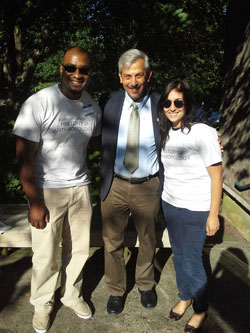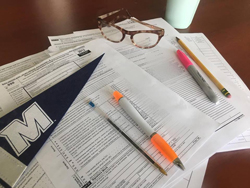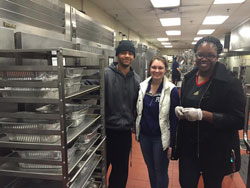Dr. Richard Veit, an anthropology professor at the University recently published the book The Archaeology of American Cemeteries and Gravemarkers. Veit was newly elected as the Chair of the History and Anthropology Department in the spring of 2014.
Outside of class, he is a prominent NJ archaeologist and an established writer. In 1997 Veit earned his PhD from the University of Pennsylvania in Historical Archaeology and has since written several books, including Digging New Jersey’s Past: Historical Archaeology in the Garden State, and New Jersey Cemetery and Tombstones: History in the Landscape.
Veit wrote The Archaeology of American Cemeteries and Gravestones with Sherene Bauer an archaeologist professor from Cornell University. The Archaeology of American Cemeteries and Gravestones was published after the duo was approached by the University of Florida Press (UPF). The UPF deduced that the research Veit and Bauer had been working on would be good in the form of a written work. Veit and Bauer were then asked to provide a proposal for a book. When the proposal was completed and approved, they began a two year literary journey collecting data and writing research for their publication. Veit said he loves writing and esteems to write another work in the future on NJ history.
The book was inspired by other known archaeologists who studied colonial gravestones. Veit and Bauer’s work however, included the photographing, measuring, and documenting of gravestones from the 17th century to the present.
The book looks at the history of American culture through the use of gravestones. The research done for this book included gravesites from different parts of the country. Veit and Bauer traveled along much of the East Coast and other states such as CA and TX. Veit said, “In the past, through the use of gravestones, people were trying to say things to future generations.”
Matthew O’Brien, an adjunct professor of History and Anthropology Department. said, “Dr. Veit is an accomplished scholar and an interesting individual who supports both his colleagues and students.” It seems as though everyone who knows Veit has a good word to say about him, including President Paul Brown. “Congratulations to Dr. Veit on his new book. His scholarly achievements and his ability to share his passion for archaeology with students is inspiring. Scholar teachers like Dr. Veit play such an important part in the distinctive and personalized educational experience at Monmouth,” said Brown.
When asked about his vision for the future of his department said, “I wish to encourage students to see the importance in their majors, and realize their career ambitions.”
According to his students, this is something he needn’t wish for. Roland Lytle and Jamie Esposito are two MU students who say they have purposefully taken Veit at least four or more times out of a love of his teaching method. Lytle, an MU graduate working on his master of the arts in anthropology said, “Veit enjoys what he does. He has taught me how to find fun in the classroom since he knows I want to teach.” Esposito, an undergraduate majoring in history and anthropology said, “He is brilliant, passionate and he understands and cares for individual students.” She went onto say, “He has unintentionally taught me to care about life and always be happy.”
At a history and anthropology mixer on Friday Sept. 12, professors of the History and Anthropology department, along with their students had the chance to socialize and mingle outside of the classroom on campus grounds.
Food was provided and stories were shared on a sun laden brick patio connected to a reserved space beside the dining hall. T-shirts were gifted to the many students who attended and raffles were won.
Such social events are one of the new activities Veit envisions for his department. Veit said, “We have a strong department with excellent teachers and phenomenal students. In the future I hope to work on new opportunities for students such as trips, traveling, internships, and new courses. The History and Anthropology Department has a visionary holding its reins, and good things are sure to come.”
PHOTO COURTESY of Richard Veit




